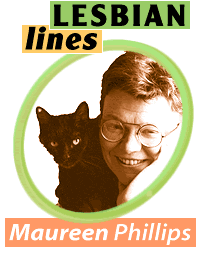As a bookseller working in a store that specializes in books on parenting, I often hear customers comment about the sheer number of tomes available.
A lot of older people say they never had access to so much material; some say it with genuine regret and some say it in a tone that suggests they possessed superior instincts on matters of child-rearing. I’m predisposed to think the volume of information is a good thing.
But we still find ourselves at a loss on some topics. It can be hard to suggest to a desperate parent that they’re going to have to be creative – they’re not going to find themselves reflected or fully represented in a book. They’re going to have work with something that needs interpretation or modification.
Though the library is increasing, lesbian and gay parents are used to performing these adjustments. The Lesbian And Gay Parenting Handbook by April Martin has been around for seven years and, by its longevity, must be considered the genre classic.
There are several other touchstones: The Lesbian Parenting Book by D Merilee Clunis and G Dorsey Green; the anthology Lesbians Raising Sons edited by Jess Wells; and Families Of Value by Jane Drucker. Things are weighted toward lesbian child-rearing, and there is still a drastic shortage of material that covers issues around non-biological parents.
Jesse Green’s The Velveteen Father tells the story of his partner Andy’s decision to adopt a child as a single, gay man. The first section of the book describes how and why Andy adopted his first child. In spite of what we might like to think about living in a more tolerant climate, we learn it’s not easy for a gay man to adopt a baby.
The memoir’s strength comes from Green’s examination of the desire to be a parent. He is particularly good at analyzing the distinctions between people who end up having kids, and people, like Andy, who have to work very hard in order to have a child in their lives. Accidents of fertility versus conscious decision-making, subject to state approval.
Green also offers a discussion on cultural perceptions of men and children. Those perceptions range from the general waves of approval Andy gets as he walks down the street carrying his kid, to the presumption of heterosexuality that go with that approval.
It’s something of a cliché for parent to respond to their children’s revelation of homosexuality with laments about lack of grandchildren. Green points out that for a lot parents, there are advantages to having childless children in their lives. They have less to compete with for one thing, and often their gay and lesbian children are more emotionally available.
As a memoir, Green’s book is obviously not a practical parenting book with advice on sibling rivalry or toilet training. But it is a thoughtful and provocative meditation on the nature of relationships, parental and other.
Out Of The Ordinary looks at the other side of the gay parenting equation; what do kids think about having a queer parent?
Most of these essays are written by people now in their twenties, looking on back on their childhood when they found out one of their parents was lesbian, gay or transgender. For most, the coming out process of their parents was highly charged.
As many of the essays deal with the homosexuality of a parent, and also (perhaps not surprisingly) the separation and divorce of those parents, sadness and even bitterness figures in most accounts. Writers balance their youthful unhappiness with their adult acceptance of their parents’ choices.
In one piece, a young man describes with heart-wrenching detail the disastrous relationship between his parents, his mother’s confession of her lesbianism and her inability to leave her marriage. In a short space he builds a compelling portrait of his own adolescent dilemma – how do you deal when your mother’s a lesbian and you can’t tell anyone? How do you deal with the fact that your parents hate each other but won’t split up?
Of particular interest is the piece by Stefan Lynch, son of the late Toronto gay activist and professor Michael Lynch. Stefan provides a unique view of the aftermath of the 1981 bathouse raids.
The piece speaks volumes about how a parent’s being out changes a child’s perception of the parent.
OUT OF THE ORDINARY:
ESSAYS ON GROWING UP WITH
GAY, LESBIAN AND TRANSGENDERED PARENTS.
Edited by Noelle Howey & Ellen Samuels.
St Martin’s Press.
216 pages. $21.99.
THE VELVETEEN FATHER:
AN UNEXPECTED JOURNEY TO PARENTHOOD.
By Jesse Green.
Ballantine Books.
242 pages, $22.

 Why you can trust Xtra
Why you can trust Xtra


